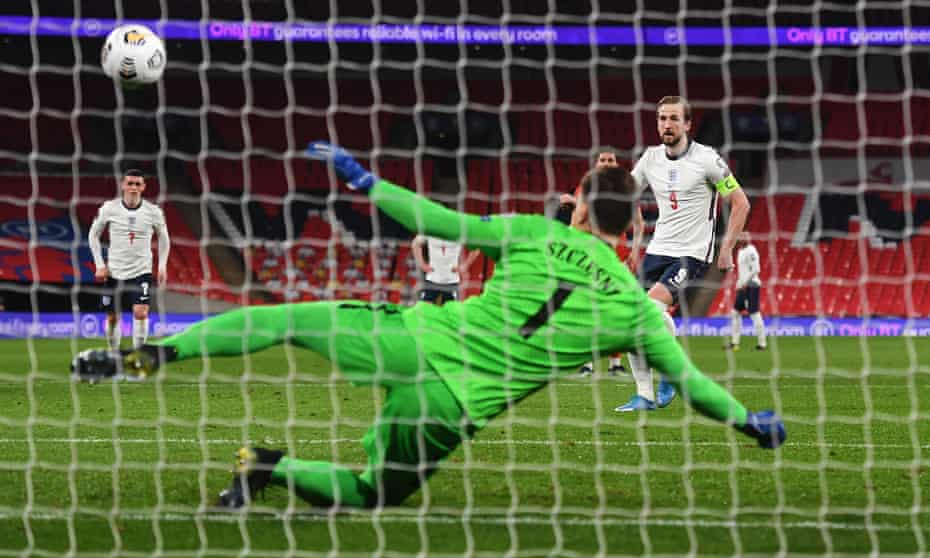With 58 minutes gone at Wembley, the score 1-0, and all sense of attacking pep drained from England’s fuel cells, an important life lesson presented itself.
Just as you can win a tournament game on the small details, by turning this game of rich human variables into a series of managed collisions, so you can also ship a goal from nowhere via a shanked pass from a high‑grade central defender prone to moments of high‑grade dither.
So it came to pass that in a World Cup qualifier where England’s possession and assumed attacking power might have demanded a two- or three-goal lead, they were instead hostage to a slender, brittle lead offered by Harry Kane’s penalty after a clever “managed fall” from Raheem Sterling.
There will be frustration at England’s second-half dip. Poland rejigged their shape, played with less fear and were ruthless in taking advantage of a mistake from John Stones, who gave the ball to the Polish attack right in front of his own goal.
Harry Maguire’s well-taken late winner demonstrated the deep reserves in this team. But it will fail to disguise a wider unease about the tone, the texture, the tempo of England’s game: that sense in the wings of attacking riches being squandered, of some parallel, Bizarro‑version England who don’t play this way, who screw up all their strength into one ball and run straight through opponents such as these.
In reality this shadow England has never really existed – in the Gareth Southgate timeline or anywhere else. It seems unlikely it will now be conjured into being from a standing start with two friendly games to go before the summer’s European Championship finals. On the plus side England are now in a commanding spot in qualifying Group I, with nine points from nine. But this game was of course about the summer and it offered two clear lessons.
First: the reality check. This wasn’t the false, phoney, ghost England struggling manfully to break down an underpowered beta‑Poland. It was the real England, the one we have been watching for the past five years, and several decades before that.
This is the game of low-risk-meets-high-risk, an attempt to win on the details, they will pursue under Southgate. It will occasionally be sluggish, tight, with no sharp edge to go with those mannered phases of possession.

Early on the red shirts sat deep. The white shirts shifted like tectonic plates, edging forward, slackening back. At times the lines were so rigid this game looked like a geometric pattern, all red and white right angles.
At which point, enter lesson No 2. England have established strengths. These are the strengths – not the shadow battalions of eager young attackers – they will take into the summer. And Raheem Sterling remains the most vital attacking cog in this team, at least until someone takes the time to build another one.
Even now Sterling’s game is still a little misunderstood. Why doesn’t he finish more of his chances? Why isn’t he more technically refined? Why does he still have those moments, even in the middle of his best periods where suddenly he looks like he’s barely played this game before and has taken to the pitch in a pair of fishing waders?
The Fiver: sign up and get our daily football email.
But it is in games such as these that Sterling’s worth becomes clear, and in a way that isn’t always apparent within the curated rectangle of the television screen. Here he was the one figure in this England team running with real purpose, interrupting the geometry, and always brave enough to turn and take the ball, to lose the ball even in those half spaces. This is what he offers, and offers relentlessly, creating difficult lines for defenders who want to settle.
With 19 minutes gone at Wembley England had yet to create an opening, yet to take a shot on target. Phil Foden nicked the ball in midfield and played a quick short pass to Sterling, who ran straight at the right side of the Poland defence, veering inside, feet battering the Wembley turf now as he entered the dead zone, that place where suddenly klaxon begins to sound, the needles whirr.
Sterling knew exactly what he was doing and what the end game was. This was pressure-play, attack by big data, a tactical surge towards the place where things tend to happen. Sterling kept on going, then took his final option, ceasing to chase the ball, and allowing Michal Helik, who was watching the ball not the man – so old-fashioned – to run into the back of his heel and make contact.
The defender had been deceived by his movement: the Corinthian objection would be that his movement was designed to draw contact from his marker.
But these are the rules and Sterling played them skilfully. Kane took the kick, and buried it down the centre.
And this – small details, clever, well-worn movements – is how Southgate sees his England team winning the real tests this summer, those two knockout games away from Wembley against more powerful opponents than these. By the end the rest of this England performance was a pretty convincing argument that he might have a point.
It is worth remembering this in the mild clamour that will follow a disappointing performance. England lacked spark and invention, even as Southgate went with the more attacking version of his England template, the 4-3-3 that allows an extra creative player. On a night rescued by a late winner from a centre‑half one thing was clear: Sterling and Kane will still be the first names in that mix.
from Football | The Guardian https://ift.tt/3dqa40P
via IFTTT

No Comment